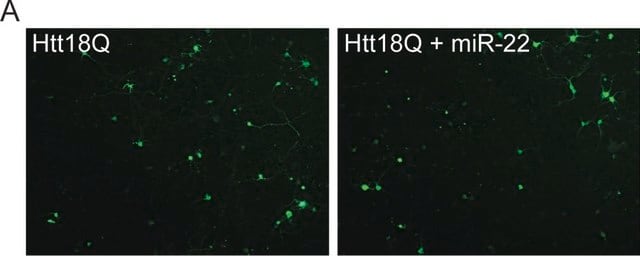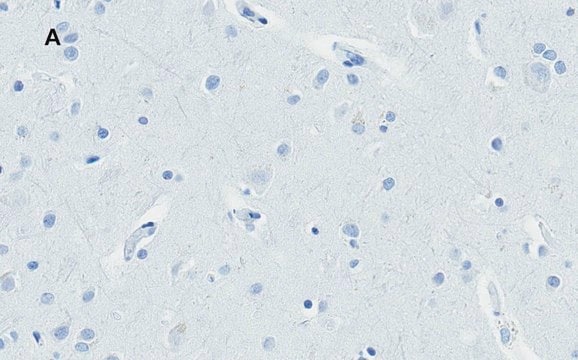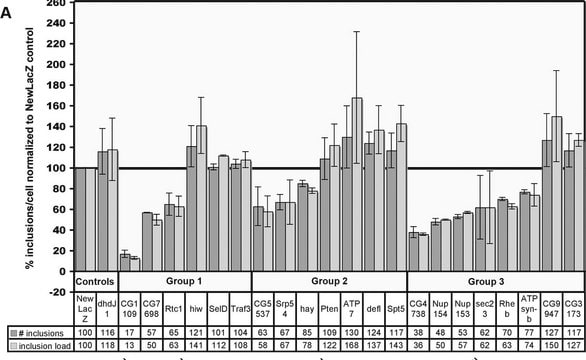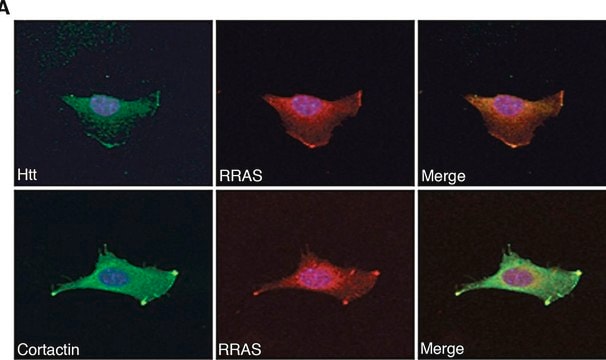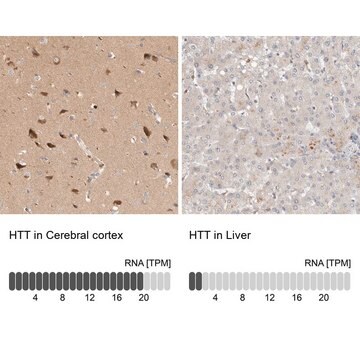推荐产品
生物源
mouse
品質等級
抗體表格
ascites fluid
抗體產品種類
primary antibodies
無性繁殖
HU-4E6, monoclonal
物種活性
mouse, human
製造商/商標名
Chemicon®
技術
ELISA: suitable
immunocytochemistry: suitable
immunohistochemistry: suitable (paraffin)
immunoprecipitation (IP): suitable
western blot: suitable
同型
IgG2b
NCBI登錄號
UniProt登錄號
運輸包裝
dry ice
目標翻譯後修改
unmodified
基因資訊
human ... HTT(3064) , SLC6A4(6532)
特異性
亨廷顿蛋白。通过蛋白质印迹未检测到与其他蛋白质的交叉反应性。
免疫原
从aa 1247到1646的亨廷顿蛋白片段作为融合蛋白
表位:a.a.1247-1646
應用
ELISA:1:500-1:5,000
蛋白质印迹(重组蛋白,不适用于天然的亨廷顿蛋白):1:500-1:5,000
冷冻和微波炉处理的石蜡切片上的免疫组化(人):1:500-1:5,000
转染细胞的免疫细胞化学:1:500-1:5,000
免疫沉淀:1:500-1:5,000
最佳工作稀释度必须由最终用户确定。
蛋白质印迹(重组蛋白,不适用于天然的亨廷顿蛋白):1:500-1:5,000
冷冻和微波炉处理的石蜡切片上的免疫组化(人):1:500-1:5,000
转染细胞的免疫细胞化学:1:500-1:5,000
免疫沉淀:1:500-1:5,000
最佳工作稀释度必须由最终用户确定。
亨廷顿蛋白蛋白检测使用该抗亨廷顿蛋白蛋白抗体a.a.247-1646,克隆HU-4E6,经验证可用于ELISA、IP、WB、IC、IH(P)。
研究子类别
神经退行性疾病
神经退行性疾病
研究类别
神经科学
神经科学
外觀
腹水。 液体,不含任何防腐剂。
儲存和穩定性
自收到之日起,在 -20° C以未稀释的等分试样可保存 12 个月。 应避免反复冻/融循环。
在运输过程中,少量抗体有时会夹在产品瓶的密封中。 对于体积为200μl或更小的抗体,我们建议在小瓶的硬质表面上轻轻敲打,或在台式离心机中短暂离心小瓶以除去容器′盖中的所有液体。
在运输过程中,少量抗体有时会夹在产品瓶的密封中。 对于体积为200μl或更小的抗体,我们建议在小瓶的硬质表面上轻轻敲打,或在台式离心机中短暂离心小瓶以除去容器′盖中的所有液体。
法律資訊
CHEMICON is a registered trademark of Merck KGaA, Darmstadt, Germany
免責聲明
除非我们的产品目录或产品附带的其他公司文档另有说明,否则我们的产品仅供研究使用,不得用于任何其他目的,包括但不限于未经授权的商业用途、体外诊断用途、离体或体内治疗用途或任何类型的消费或应用于人类或动物。
未找到合适的产品?
试试我们的产品选型工具.
儲存類別代碼
10 - Combustible liquids
水污染物質分類(WGK)
nwg
閃點(°F)
Not applicable
閃點(°C)
Not applicable
Anjalika Chongtham et al.
Human molecular genetics, 29(4), 674-688 (2020-01-17)
Huntington's disease (HD) is caused by an expansion of a poly glutamine (polyQ) stretch in the huntingtin protein (HTT) that is necessary to cause pathology and formation of HTT aggregates. Here we ask whether expanded polyQ is sufficient to cause
Wei Li et al.
The Journal of biological chemistry, 281(23), 15916-15922 (2006-04-06)
Huntington disease is an inherited neurodegenerative disorder that is caused by expanded CAG trinucleotide repeats, resulting in a polyglutamine stretch of >37 on the N terminus of the protein huntingtin (htt). htt is a large (347 kDa), ubiquitously expressed protein.
Baehyun Shin et al.
Molecular therapy. Nucleic acids, 11, 416-428 (2018-06-03)
The CAG repeat expansion that elongates the polyglutamine tract in huntingtin is the root genetic cause of Huntington's disease (HD), a debilitating neurodegenerative disorder. This seemingly slight change to the primary amino acid sequence alters the physical structure of the
Passive immunization against phosphorylated tau improves features of Huntington's disease pathology.
Melanie Alpaugh et al.
Molecular therapy : the journal of the American Society of Gene Therapy, 30(4), 1500-1522 (2022-01-21)
Huntington's disease is classically described as a neurodegenerative disorder of monogenic aetiology. The disease is characterized by an abnormal polyglutamine expansion in the huntingtin gene, which drives the toxicity of the mutated form of the protein. However, accumulation of the
Maria Masnata et al.
Acta neuropathologica, 137(6), 981-1001 (2019-02-23)
In recent years, evidence has accumulated to suggest that mutant huntingtin protein (mHTT) can spread into healthy tissue in a prion-like fashion. This theory, however, remains controversial. To fully address this concept and to understand the possible consequences of mHTT spreading
我们的科学家团队拥有各种研究领域经验,包括生命科学、材料科学、化学合成、色谱、分析及许多其他领域.
联系技术服务部门
